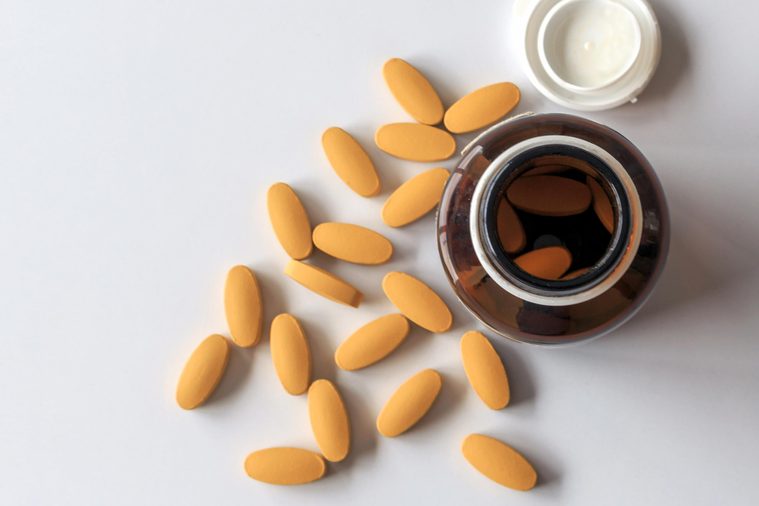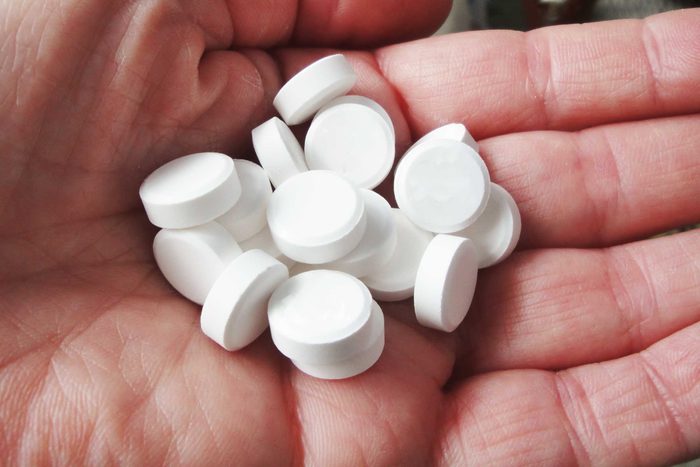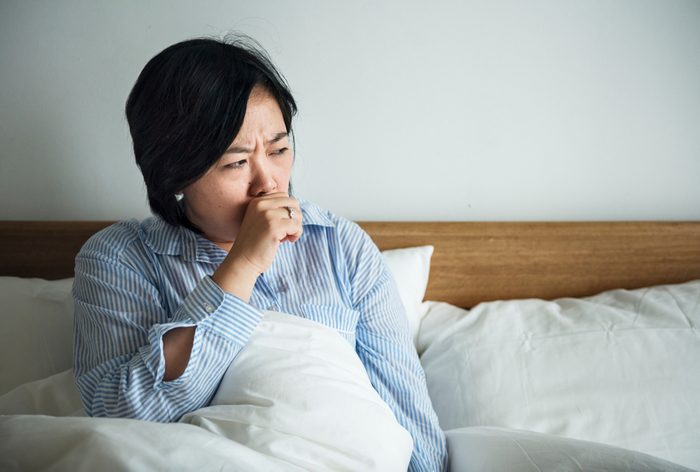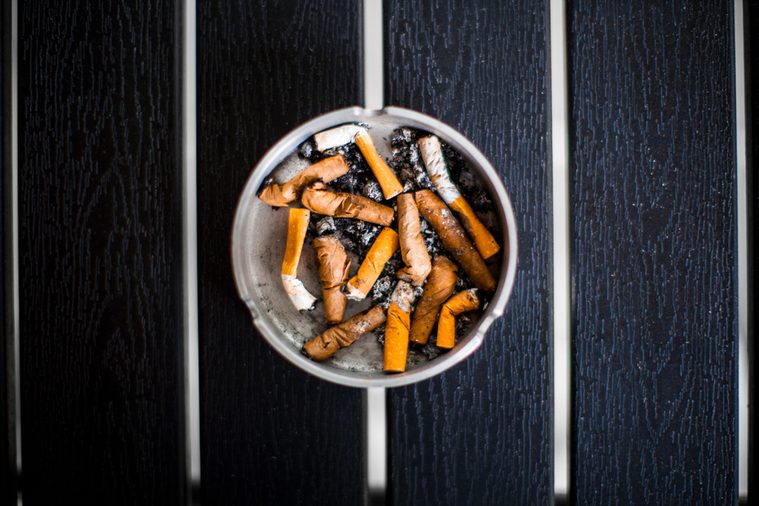You know what to do with the flu… right?
That’s right, get plenty of fluids, rest, and continue to eat healthfully. But there are some habits we indulge in that can prolong the misery. Here’s what doctors say you should avoid doing to make sure you heal from the flu faster—and don’t risk your sickness turning into something worse.

Don’t load up on meds so you can work
It’s never easy to predict how bad an upcoming flu season will be, says Nesochi Okeke-Igbokwe, MD, MS, a physician and health and wellness expert in New York. But this much is always certain: “The influenza virus is … extremely contagious and has the propensity to spread quickly,” she says. “It’s never a good idea to attempt to mask your flu symptoms and push yourself to go to work or school when you know you are fighting a viral infection—you’re only exposing more people in your community.”
Although some employers may frown on taking sick days, when it comes to the flu, staying home is really best for everyone. Check out these 12 habits that will naturally boost your immune system.

Don’t rush to the ER
Yes, the flu can be serious—even life-threatening—for certain groups of people, such as children under age five, seniors 65 and older, pregnant women, people in long-term health-care facilities, people with weakened immune systems, and those with underlying medical conditions like asthma, heart disease, and diabetes, according to the Centers for Disease Control and Prevention (CDC). Unless you fall into one of those categories, you should be able to fight it off on your own. “It’s important to recognize that not everyone who gets the flu will warrant an inpatient hospital admission, and may not experience very severe illness,” says Dr. Okeke-Igbokwe. Hospital emergency rooms can become overcrowded during severe flu seasons, making it tougher for those who really need the care to get it fast. Find out the 6 clear signs you have the flu.

Don’t snuggle
You definitely want to take it easy when you have the flu, but snuggling up with a loved one isn’t recommended (especially if you’ll be tempted to smooch). “The flu virus is extremely contagious, so make sure, if you contract the flu, that you stay inside and stay away from others in your house,” says Justin Skolnick, DO, an emergency medicine physician in Manahawkin, New Jersey. Sometimes just close-talking with someone is enough to pass the virus along since it lives in tiny droplets of moisture expelled by breathing (as well as coughing or sneezing).

Don’t get lazy about washing your hands
You can easily infect the people around you just by flipping on a light switch. “Most people don’t realize the flu virus can survive for up to 24 hours on hard surfaces like door handles, tables, and railings,” says Dr. Skolnick. “So making sure to wash your hands is paramount.” Be sure to scrub your hands for at least 20 seconds (the time it takes to hum or sing “Happy Birthday” twice). Learn the 10 wrong ways to wash your hands.

Don’t stay up late watching your favorite movie
There’s nothing like a good movie and a soft blanket when you’re sick and miserable. But do your TV watching during the day so that you can toddle off to bed early. A study published in 2019 in the Journal of Experimental Medicine found that a good night’s sleep can boost the effectiveness of certain specialized immune cells called T cells. “Your immune system needs time to mount a defense,” Ian Tong, MD, the East Palo Alto, California-based chief medical officer of Doctor on Demand. “Rest and proper sleep will strengthen your immune system. Sleep as much as possible to give your body a chance to recover.”

Don’t try to break a fever with a cold shower
You may have been told by a parent or grandparent that an ice bath or cold shower is a good way to quickly lower a fever. But cold water will actually spike your temperature higher, says Patricia Whitley-Williams, MD, professor and chair in the department of pediatrics at Rutgers Robert Wood Johnson Medical School in New Brunswick, New Jersey. Lukewarm water is best for helping to break fevers, she says. Make sure you’re up-to-date on your flu knowledge with these 10 influenza facts.

Don’t assume it’s too late for Tamiflu
Although antibiotics won’t fix the flu, prescription antiviral medications like Tamiflu can, according to a review of research published in 2015 in The Lancet. Antivirals work best if you take them within two days of getting sick; some people still benefit if they take antivirals later, according to the CDC. Learn how to tell the difference between a cold and the flu.

Don’t go to a dinner party (or any other party)
You may miss your social life, but “if you have influenza, you shouldn’t be overly social with others, even with mild symptoms,” warns Amesh Adalja, MD, a senior scholar at the Johns Hopkins University Center for Health Security in Baltimore, Maryland. Respiratory droplets containing the virus can travel six to eight feet in the air. What’s more, drinking alcohol can dehydrate you and weaken your immune system, making it harder for your body to fight off the virus. Be sure to avoid these 6 other foods or drinks that can make a cold or flu worse.

Don’t “double-dip” on medication
Many of us automatically reach for a Tylenol (also known as acetaminophen) to soothe body aches and lower a fever. But be careful if you’re taking over-the-counter meds to treat coughing, congestion, or sleeplessness, too. Many of these “multisymptom” products also contain acetaminophen—and doubling up on this medication can lead to liver damage.

Don’t ease up on fluids
“Staying hydrated with water, decaffeinated tea, sports drinks, and sugar-free drinks is best to help fight dehydration associated with fever,” says Dr. Tong. And some studies–including one published in 2018 in Proceedings of the National Academy of Sciences–suggest that water can temporarily thin mucus, helping you feel less congested. Here are 10 natural cough remedies that are worth trying.

Don’t ask your doctor for antibiotics
Both the common cold and the flu are caused by viruses, and antibiotics only work for bacterial infections. Not only will the drugs do nothing to help your flu, they could even harm you. Taking antibiotics when you don’t need them can lead bacteria to become resistant, making them harder to kill. These so-called superbugs can stick around in your body and cause serious infections later on that may require stronger drugs or even a hospital stay. Try these 10 habits doctors use to avoid the cold and flu.

Don’t try to stick to a hard-core workout schedule
While light exercise can support your immune system, an intense workout will just make you feel worse. “Living in denial of your illness could do more harm than good,” Dr. Tong says. “Don’t deny yourself sleep or rest. If you love to exercise, dial down the intensity to just walking for a couple of days or until you are feeling better.”

Don’t cough into your hands
Sure, coughing or sneezing into cupped hands is better than blasting virus-filled droplets into the air. But afterward, you’ll leave a trail of the virus on anything you touch, including the bathroom door when you go to wash your hands. The flu virus can live for hours on even hard objects—potentially infecting others—so cough or sneeze into a tissue or the crook of your arm.

Don’t hang out with a smoker
This one may seem obvious since you already know that tobacco smoke—whether you’re the one smoking or not—damages your lungs. But that goes double when you’re sick since cigarette smoke weakens immunity against infections, as research, including a study published in 2017 in the journal Oncotarget, has shown. Secondhand smoke irritates the lungs and can make congestion and coughing worse. Make sure you know the 9 clear signs a cold is coming on—and how to stop it.
